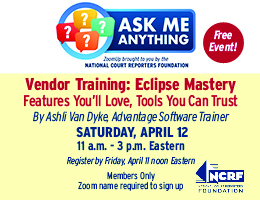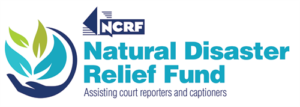Overcoming the fear of writing realtime can become easier if you follow the tips and suggestions shared with attendees of a session led by Marybeth Everhart, RPR, CRI, CPE, during NCRA’s 2015 TechCon event held in Denver, Colo., April 10-12.
Everhart told attendees that to help overcome their fears of writing realtime, they need to understand the three parts of the process: writing, connectivity as it relates to hooking up other people to be able to see the realtime being produced, and self confidence.
“If any one of these parts is troubling for you then you will have problems with producing quality realtime,” she said
Everhart said a good way to improve the quality of realtime writing is to make a commitment to practice writing for 15 minutes each day, followed by an analysis to see what mistakes were made.
“Don’t just do it; check it to see what mistakes you are making. Fixing something will improve your skills,” she said and added that keeping a diary of mistakes or focusing on writing the mistakes correctly will help increase quality by helping to create positive muscle memory and teach the brain to stroke the right keys and avoid the same mistakes.
Other tips Everhart shared included:
- Consider what your translation rate is. Stop and take a look at it right way. If you don’t remember hearing a word that you have written, proofread your practice with the audio.
- Keep current with technology and learn everything about the software you are using and the all of the features it offers.
- Ask other reporters who are already writing realtime to help you with learning how to connect your realtime system.
- View webinars and attend seminars that offer realtime information and training.
- TRAIN groups are free. Join one or start one.
Everhart also said that it is important to teach clients about realtime and its benefits: “Show it to them and create a market for yourself. Go to someone you really like. Tell them the benefits. Provide them with realtime on a regular basis for free and follow up with a bill that you credit out to establish the value of the service for them.”
By doing so, realtime writers can better educate their clients on how realtime works as well as show them that while it is also not always perfect and that some terms might not come up correctly, the end product will be accurate, Everhart explained. Set your clients’ expectations, she noted.












